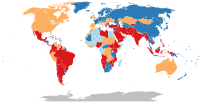
Photo from wikipedia
This research explores emergency remote education, defined as a rapid, system-wide pivot to remote education in response to emergencies that disrupt normal institutional processes. To do so, we explore student… Click to show full abstract
This research explores emergency remote education, defined as a rapid, system-wide pivot to remote education in response to emergencies that disrupt normal institutional processes. To do so, we explore student perceptions of the successes and failures of the pivot to online learning at the onset of the COVID-19 pandemic. A mixed-methods survey was distributed to a large sample of university students to explore satisfaction, challenges, opportunities, and instructional needs. Results highlight the importance of faculty hard skills (e.g., technical skills) and soft skills (e.g., compassion), although soft skills were noted more frequently, suggesting that soft skills may be critically important in the context of emergency remote education. Results also reveal that online education in general suffers from a perception as being inherently lower quality than in-person education, and highlight the importance of providing faculty with proper training and support to set them up for success. Based on these results, we provide a number of suggestions for approaching the development, delivery, and support of emergency education and online marketing education in the future.
Journal Title: Journal of Marketing Education
Year Published: 2022
Link to full text (if available)
Share on Social Media: Sign Up to like & get
recommendations!